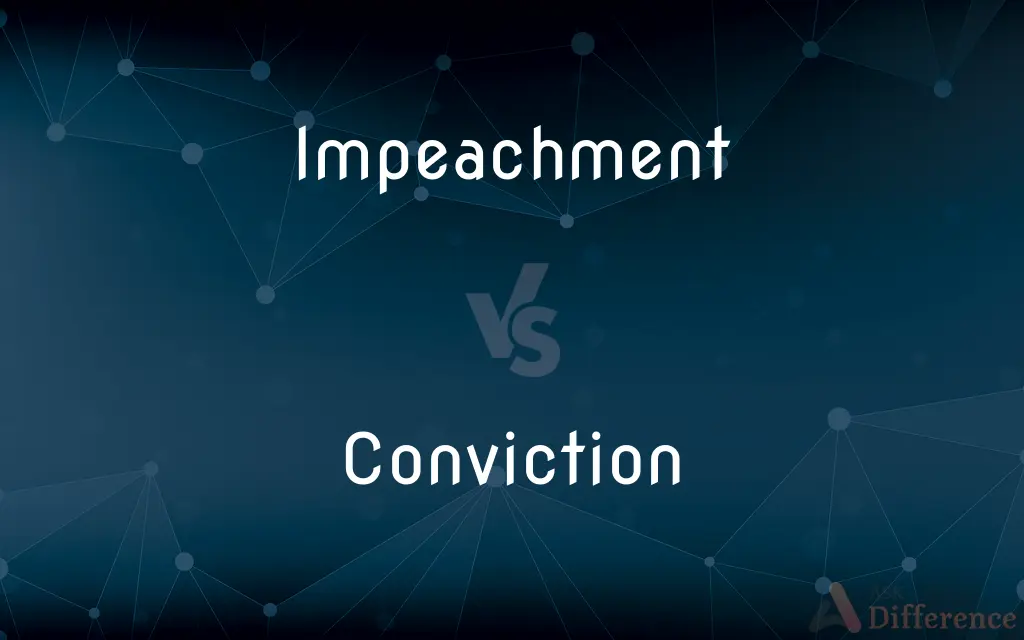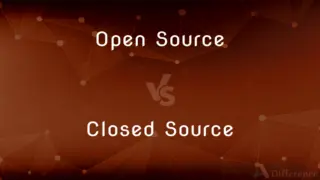Impeachment vs. Conviction — What's the Difference?
By Tayyaba Rehman & Fiza Rafique — Published on September 29, 2023
Impeachment is the formal accusation of wrongdoing against a public official, while Conviction is the legal confirmation of guilt that may follow impeachment.

Difference Between Impeachment and Conviction
Table of Contents
ADVERTISEMENT
Key Differences
Impeachment refers to the formal process where a legislative body levels accusations against a public official for misconduct. It is akin to an indictment in criminal law but does not equate to guilt. Conviction, on the other hand, is the actual finding of guilt, generally carried out by another legislative body or through a judicial process. Conviction comes after impeachment and trial, and it leads to penalties like removal from office.
In the United States, for example, impeachment of a President is initiated in the House of Representatives. The House presents and votes on articles of impeachment, but this does not mean the President is guilty of anything. Conviction takes place in the Senate, where a two-thirds majority vote is needed to confirm guilt and possibly remove the President from office. The Senate acts as a sort of jury in this case.
Impeachment usually involves political considerations, as it is often initiated by members of a legislative body. Because of its political nature, impeachment can sometimes occur even without a strong legal basis. Conviction, however, is a legal finding that generally follows strict procedures and requirements, such as a supermajority vote in the Senate for federal officials in the United States.
In a legal context outside of politics, the term "conviction" refers to the formal declaration of guilt by a court of law, often after a trial. Impeachment doesn't typically exist in this non-political context. Unlike impeachment, conviction in a court of law can result in various penalties including imprisonment, fines, or probation.
Comparison Chart
Nature
Accusation
Confirmation of guilt
ADVERTISEMENT
Conducted By
Legislative Body
Legislative or Judicial Body
Legal Status
Not a legal finding of guilt
Legal finding of guilt
Penalties
None directly
Removal from office, etc.
U.S. Example
House of Representatives
Senate
Compare with Definitions
Impeachment
Not a Conviction: "Impeachment is not a legal finding of guilt."
Impeachment proceedings began, but no conviction was made.
Conviction
Legal Guilt: "Conviction is the formal declaration of guilt."
The jury returned a conviction on all counts.
Impeachment
Legislative Process: "Impeachment is carried out by a legislative body."
The state legislature has the power of impeachment.
Conviction
Judicial Process: "Conviction is usually determined by a court."
The conviction was overturned on appeal.
Impeachment
Formal Accusation: "Impeachment is the formal leveling of charges against a public official."
The House passed articles of impeachment against the President.
Conviction
Results in Penalties: "Conviction often leads to penalties like imprisonment or removal from office."
The conviction resulted in a ten-year prison sentence.
Impeachment
Political in Nature: "Impeachment often involves political considerations."
The impeachment seemed motivated by partisan issues.
Conviction
Follows Trial: "Conviction typically follows a judicial or legislative trial."
After impeachment, the Senate trial led to a conviction.
Impeachment
Step in Removal: "Impeachment is often the first step in removing an official from office."
Impeachment proceedings were initiated to potentially remove the governor.
Conviction
Beyond Politics: "Conviction is a legal, not just political, finding."
His conviction stood, despite political controversies.
Impeachment
To make an accusation against
Impeach someone of a crime.
Conviction
The judgment of a jury or judge that a person is guilty of a crime as charged.
Impeachment
To bring formal charges against (a public official) for wrongdoing while in office.
Conviction
The state of being found or proved guilty
Evidence that led to the suspect's conviction.
Impeachment
To raise doubts about; discredit or disparage
Impeach a witness's credibility.
Impeach someone's character.
Conviction
The act or process of convincing.
Impeachment
(countable) The act of calling into question or challenging the accuracy or propriety of something.
Conviction
The state or appearance of being convinced
She spoke with real conviction on the matter.
Impeachment
A demonstration in a court of law, or before another finder of fact, that a witness was ingenuine before, and is therefore less likely to tell the truth now.
Conviction
A fixed or strong belief.
Impeachment
An accusation that a person has committed a crime against the state, such as treason.
Conviction
(countable) A firmly held belief.
Impeachment
The act of impeaching or charging a public official with misconduct, especially if serious, often with the aim of having the official dismissed from office.
Conviction
(countable) A judgement of guilt in a court of law.
Impeachment
(uncountable) The state of being impeached.
Conviction
(uncountable) The state of being found or proved guilty.
Impeachment
Hindrance; impediment; obstruction.
Conviction
(uncountable) The state of being wholly convinced.
Impeachment
The act of impeaching, or the state of being impeached
Willing to march on to Calais,Without impeachment.
Conviction
The act of convicting; the act of proving, finding, or adjudging, guilty of an offense.
The greater certainty of conviction and the greater certainty of punishment.
Impeachment
A calling to account; arraignment; especially, of a public officer for maladministration.
The consequence of Coriolanus' impeachment had like to have been fatal to their state.
Conviction
A judgment of condemnation entered by a court having jurisdiction; the act or process of finding guilty, or the state of being found guilty of any crime by a legal tribunal.
Conviction may accrue two ways.
Impeachment
A calling in question as to purity of motives, rectitude of conduct, credibility, etc.; accusation; reproach; as, an impeachment of motives.
Conviction
The act of convincing of error, or of compelling the admission of a truth; confutation.
For all his tedious talk is but vain boast,Or subtle shifts conviction to evade.
Impeachment
A formal document charging a public official with misconduct in office
Conviction
The state of being convinced or convicted; strong persuasion or belief; especially, the state of being convicted of sin, or by one's conscience.
To call good evil, and evil good, against the conviction of their own consciences.
And did you presently fall under the power of this conviction?
Conviction
An unshakable belief in something without need for proof or evidence
Conviction
(criminal law) a final judgment of guilty in a criminal case and the punishment that is imposed;
The conviction came as no surprise
Common Curiosities
What is Impeachment?
Impeachment is the formal accusation against a public official for misconduct.
What is Conviction?
Conviction is the legal confirmation of guilt.
Who carries out Impeachment?
A legislative body usually carries out impeachment.
Does Impeachment remove someone from office?
No, only a conviction can potentially remove someone from office.
Is Impeachment always political?
While often political, impeachment is a formal process for leveling charges.
What are the penalties for Conviction?
Penalties can include removal from office, fines, or imprisonment.
Is Impeachment a Conviction?
No, impeachment is an accusation, not a legal finding of guilt.
What follows Impeachment?
After impeachment, a trial may occur which can lead to conviction.
What's needed for Impeachment in the U.S.?
A simple majority in the House of Representatives is needed for impeachment.
Who carries out Conviction?
Conviction can be determined by a legislative or judicial body.
What's needed for Conviction in the U.S.?
A two-thirds majority in the Senate is needed for conviction.
Is Conviction political?
Conviction is a legal finding, though in cases like impeachment, politics can be involved.
Can Impeachment happen without Conviction?
Yes, impeachment can occur without subsequent conviction.
What happens after a Conviction?
After a conviction, penalties like removal from office can be enacted.
Is Impeachment applicable to non-politicians?
Generally, no. Impeachment is a process typically reserved for public officials.
Share Your Discovery

Previous Comparison
Open Source vs. Closed Source
Next Comparison
Humiliatory vs. IgnominiousAuthor Spotlight
Written by
Tayyaba RehmanTayyaba Rehman is a distinguished writer, currently serving as a primary contributor to askdifference.com. As a researcher in semantics and etymology, Tayyaba's passion for the complexity of languages and their distinctions has found a perfect home on the platform. Tayyaba delves into the intricacies of language, distinguishing between commonly confused words and phrases, thereby providing clarity for readers worldwide.
Co-written by
Fiza RafiqueFiza Rafique is a skilled content writer at AskDifference.com, where she meticulously refines and enhances written pieces. Drawing from her vast editorial expertise, Fiza ensures clarity, accuracy, and precision in every article. Passionate about language, she continually seeks to elevate the quality of content for readers worldwide.













































